A Place for Discovery
Northwestern moves forward with plans to build new health and natural sciences facility
BY TAMARA FYNAARDT

A new eco-friendly health and natural sciences building will anchor the southwest corner of the campus green and create a more obvious, welcoming entry to campus for visitors arriving from the west.
STRONG IN SCIENCE. That describes Northwestern's science faculty and students. It describes the college's accomplished alumni researchers, science teachers and healthcare workers. And soon, it will describe a new, $24.5 million state-of-the-art building for the health and natural sciences. "Northwestern has already built a strong program and reputation in the sciences," Virg Muilenburg '62, biology professor emeritus, says. "Now we need facilities to match."
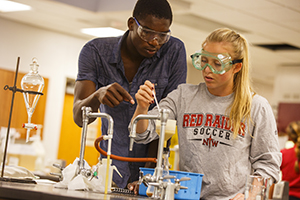
FJ GAYLOR
As graduates, Northwestern’s more than 300 science majors head into research and healthcare careers where there are more jobs than professionals to fill them. They’re also welcome at graduate schools across the country; for example, 80 percent of Northwestern grads who apply to medical school are accepted the first time around (compared to a national med school matriculation rate of 45 percent).
Taken together, the health and natural sciences (athletic training, biology, chemistry, exercise science and nursing) is Northwestern's biggest academic program with just over 300 majors. Biology itself is the college's fourth largest major (137 students), and nursing is the sixth largest (78 students). And the majority of these students are headed into careers where they'll be in high demand.
According to the U.S. Department of Labor's Occupational Outlook Handbook, careers identified as prospects for growth potential between now and 2020 include nursing, physical therapy and physician assistant (all with a 30 percent projected growth rate or faster); biomedical engineers (20 to 29 percent); and environmental scientists, health educators, and physicians and surgeons (10 to 19 percent). And in the case of nursing, the U.S. Department of Health and Human Services recommends that at least 80 percent of nurses hold a minimum of a B.S.N. degree, which Northwestern offers. Currently only 35 percent of nurses have a B.S.N.
Booming career prospects in the health and natural sciences has more college students clamoring for science degrees. And that demand is stretching Northwestern's science facilities to the limit.
In 2014 a report prepared by a task force of Northwestern administrators and science professors revealed that enrollment in science labs had grown 58 percent since 2005. In addition, the average size of science classes had increased by 41 percent. The report concluded the college's science facilities are operating at maximum capacity achieved through time and space efficiencies that run the risk of reaching a tipping point when more will no longer be better.
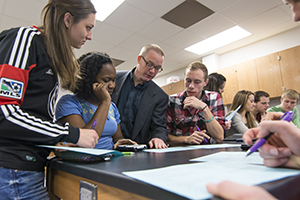
DOUG BURG
In the last decade, average class sizes in Northwestern science courses have grown by 41 percent, and lab enrollment has grown by 58 percent—to the point that current science facilities are at or, in some cases, beyond capacity.
"The students working with me on cancer cell growth responses to various plant extracts are doing marvelous work—but in a closet-sized room with only a four-foot fume hood," says Dr. Sara Sybesma Tolsma '84. She envisions expanding her study and the number of students involved when she's no longer limited to a space that can fit only one or two students at a time.
In response to both the task force report and the college's 2012 strategic plan that identifies the sciences as an area of strength in which to invest more resources, college administrators planned and launched the Discover Campaign. The $30 million campaign is raising funds for a new 61,000-square-foot health and natural sciences building as well as science scholarships and student research fellowships.
"Northwestern has enjoyed a strong reputation in the sciences since we became accredited as a four-year institution in the 1970s," says President Greg Christy, "and part of the reason for that strength—and a real distinctive of Northwestern, I believe—is the compelling way our professors integrate science and faith. They pursue both their scientific exploration and their desire to know God with bold curiosity and a deep trust that what they discover in the natural world reveals something about God."
The new science building will bring the departments of biology, chemistry and nursing all under one roof and into collaborative proximity to each other. Planned for the southwest corner of the campus green, just west of the Ramaker Center, it will also expand the resources of the natural science programs to include a greenhouse and vivarium for the care of live research animals, such as mice.

Adaptive classrooms will enable whole-class instruction as well as small-group student work. Laboratories throughout the new building will also be adaptive and include spaces designated solely for professor-student collaborative research.
Most importantly, the new building will increase the number of classrooms and labs available for student learning and research, including the ongoing research students conduct individually or in small teams with professors—research that is invaluable on students' medical and graduate school applications.
Jordan Reinders '15 credits his three summers of research with Dr. Laura Furlong and Dr. Todd Tracy as among the reasons he's succeeding as an entomology graduate student. "Now that I'm at the University of Nebraska, I've found I was very well prepared," he says. "A lot of the classes are actually easier than the biology classes I had as an undergrad."
Students like Reinders are also involved in Furlong's multi-year study of mayfly DNA and Tolsma's cancer research, and chemistry students are collaborating with Dr. Dave Arnett and Dr. Karissa Carlson '02 in an enzymology study that involves producing their own enzymes in a campus lab. Northwestern is also the only Iowa college participating in SEA-PHAGES, a discovery-based undergraduate research effort funded by the Howard Hughes Medical Institute.
The rigorous science education Northwestern students receive and the support and mentorship they get from expert professors leads them to places around the world where they use what they've learned to change lives. At Exemplar Genetics, based in northwest Iowa, CEO Dr. John Swart '90 and his team are world leaders in producing swine models that can be used to test cures for cystic fibrosis. At the University of Illinois-Chicago hospital and medical school, Dr. Kent Hoskins '84 specializes in cancer genetics and breast cancer treatment. In Haiti, nurse missionary Kristie (De Boer '95) Mompremier started nutrition centers—as well as a school and seminary.
Dr. Bryan Den Hartog '81, a Des Moines orthopedic surgeon, is chair of the leadership committee for the Discover Campaign. "Northwestern helped me discover my passion for medicine and encouraged me to develop the skills and qualities I would need as a doctor: a solid science background and a heart to serve," he says. "I'm grateful for the faithful education I received at Northwestern. That's why I'm giving back to it." 
Discover Campaign
Gifts and pledges as of December 2016
| Gifts & pledges | Total needed | |
| Natural and health sciences building | $19,050,149 | $24,500,000 |
| Building endowment | $23,602 | $2,500,000 |
| Science scholarships | $1,205,859 | $1,500,000 |
| Student research fellowships | $162,029 | $1,500,000 |
| Total | $20,441,639 | $30,000,000 |
|---|
Help us get to $22 million for the science building by Feb. 15
In mid-December, President Christy announced that an anonymous donor who already has given $1 million to the campaign will give an additional $1 million as a matching gift challenge. To receive the match, Northwestern must reach $21 million in gifts and pledges for the $24.5 million building by Feb. 15. To help Northwestern get the $1 million matching gift, visit the website and give to the Discover Campaign: discover.nwciowa.edu
To see more drawings of the new science building, visit nwciowa.edu/science-facility
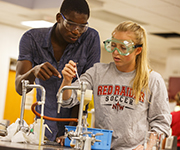 A $24.5 million state-of-the-art building for the health and natural sciences is North-western’s next construction project.
A $24.5 million state-of-the-art building for the health and natural sciences is North-western’s next construction project.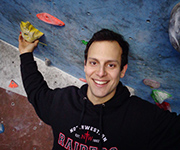 In the Transylvanian Alps and a gym in Romania’s Jiu Valley, Felipe Silva is helping youth climb out of a bleak environment.
In the Transylvanian Alps and a gym in Romania’s Jiu Valley, Felipe Silva is helping youth climb out of a bleak environment.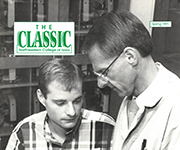 First published in 1891–92, Northwestern’s Classic is celebrating its 125th anniversary.
First published in 1891–92, Northwestern’s Classic is celebrating its 125th anniversary.
Classic Comments
All comments are moderated and need approval from the moderator before they are posted. Comments that include profanity, or personal attacks, or antisocial behavior such as "spamming" or other inappropriate comments or material will be removed from the site. We will take steps to block users who violate any of our terms of use. You are fully responsible for the content that you post. Comments posted do not reflect the views or values of Northwestern College.